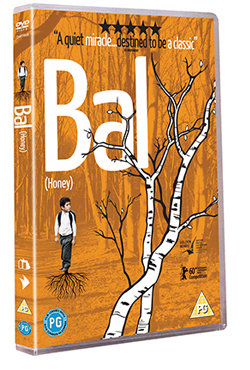 Film: Bal (Honey) (Kaplan Films 2010)
Film: Bal (Honey) (Kaplan Films 2010)
Director: Semih Kaplanohlu
Cast: Bora Altas, Erdal Besikçioglu,Tülin Özen
?All men are by nature equal, made all of the same earth by one Workman; and however we deceive ourselves, as dear unto God is the poor peasant as the mighty prince.?
Plato
There’s a Beekeeper Up in That Tree (and I Think He Cares about Me)
Yakup makes wooden beehives and places them in the treetops in the forested mountains of Turkey. This is how he supports himself, his wife, and his young son, Yusuf.
It is a serene and beautiful life. The mountains are grand and the views spectacular, full of winding streams, great trees that dance and whisper in the wind, and lush greenery you can almost smell. In his spare time, Yakup carves toys for his son. He gets his rope from a neighbour who makes it by hand. The region appears to enjoy political stability. It’s an idyllic life by any standards.
But Yakup’s vocation is a dangerous; he has to climb great heights to place the hives and later to extract the honey. Sometimes Yakup must travel on foot for several days at a stretch to set up his hives. He goes alone, which means there’s no one to get help if he has an accident. This is troubling to his family, but he must earn a livelihood, so off he goes.
To complicate matters, the bees are inexplicably dying?which means that he must travel ever further from home to place the hives.
It’s fairly common knowledge that pesticides and other modern airborne pollutants kill bees, or at least weaken their resistance to viruses and parasites. It’s not stated explicitly in the film, but That’s what goes through your head as you watch Yakup reach into the hive and draw out handfuls of dead bees.
The other thought that might cross your mind is the indifference of nature: whatever our illusions as to its beneficence, nature is under no compunction (and is far too uninterested) to consistently reward our labours by serving up our daily needs. This is the reality with which Yusuf is faced, and his desperate need to come to terms with it forms the dramatic tension in the story.
In the context of this incredibly beautiful but indifferent world is a father whose unconditional love, patience, and understanding are the highest things in Yusuf’s narrow experience.
The family?and the community?is Muslim, and the twin axes around which their lives swirl are Islam and natural cycles. As is usual in such cases this leads to a syncretism of the traditional religion with local ancestral spirituality and custom.
Much to the chagrin of Marxists, peasants are among the most spiritual of all the human rankings; there’s something about that intimacy with nature and time that expands God-consciousness.
Little Yusuf adores his father and strives to please and emulate him. The taciturn Yakup is tender in his silent way, always thinking of his son and taking his role as Dad very seriously. Yet he is cold and distant toward his young, pretty wife, who obviously adores him.
Bal is the third instalment in the Yusuf trilogy, three films that run backward chronologically through the life of Yusuf, the son. In the first film, Egg, Yusuf is a grown man, a poet, returning to his mountain village after receiving news of his mother’s death. In the second, Milk, he’s experiencing the bittersweet joy and disappointment of young adult life. He’s been declined entrance to university, yet some of his poems are being published.
In Bal, the final part of the trilogy, you see the existential quandary written large: the innocent boy rooted in peasant life, but gifted in such a way that he is able to see it all as no one has seen it before.
Words, written and spoken, bear a burden of angst in Bal. Yusuf suffers from a speech impediment and in school he must rehearse a passage before he’s able to read it to the class without stuttering. He avoids the other children, staying inside while they play outdoors. He loves stories and poetry. But most of the time he’s silent and can only stop stuttering when whispering to his dad, who gently indulges him.
Bal fulfills eight of the Mindful Bard’s criteria for films well worth seeing: 1) it is authentic, original, and delightful; 2) it poses and admirably responds to questions that have a direct bearing on my view of existence; 3) it provides respite from a sick and cruel world, a respite enabling me to renew myself for a return to mindful artistic endeavour; 4) it is about attainment of the true self; 5) it inspires an awareness of the sanctity of creation; 6) it displays an engagement with and compassionate response to suffering; 7) it makes me want to be a better artist; and 8) it makes me appreciate that life is a complex and rare phenomenon, making living a unique opportunity.
Wanda also penned the poems for the artist book They Tell My Tale to Children Now to Help Them to be Good, a collection of meditations on fairy tales, illustrated by artist Susan Malmstrom.


